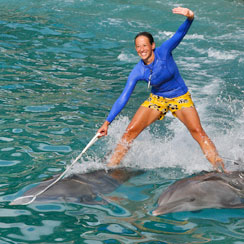We all remember being young, and perhaps, motivated by a recent fascination with an event or animal that made a favourable impression, saying things like “When I grow up, I’m going to be a race car driver!” or, “I’m going to be a dolphin-trainer!”. Few of us will ever become these things, naturally, but a few of us do.
Now the first example is awesome, for those who can do it – also, much respect for people like Leilani Munter and Lewis Hamilton, who’ve done so much to help raise awareness of how we so casually dole out cruelty to other animals. But the second, well… not so much. Inevitably, the hard facts of reality assert themselves, and any thinking person has to come face-to-face with the realities of the captivity industry. Which brings me to my question.
Who becomes a dolphin trainer? This is really quite puzzling to me. And even more so is the question of why they stay, as the evidence inevitably begins to add up. How does one compartmentalize the suffering of a fellow sentient being?
IMATA stands for the International Marine Animal Trainers’ Association. This organization is entirely complicit in the horrific outcomes effected by dolphin drive-hunts. IMATA is present on site, a full participant, in the brutal selection process which decides who lives and who dies, and which members will be ripped from the pod, which to a dolphin is its life-long family. And which mothers will be separated from their babies. If you’ve ever seen that process, it is ugly, and it is deeply disturbing.
Now, someone will no doubt wish to point out that IMATA’s official Drive Fisheries Statement goes as follows:
IMATA strongly opposes the slaughter of whales and dolphins that occurs in drive fisheries. Individuals participating in the deliberate killing of dolphins in a drive fishery are not eligible for IMATA membership.
There is so much wrong with this it’s hard to know where to begin. First of all, use of the word “Fisheries” is a tacit acquiescence to the Taiji hunters stance that the activity they’re engaged in is “fishing”. There’s no need to elaborate on the offensiveness of that. As well, IMATA continues to be a direct beneficiary of these hunts, whether it condemns the “deliberate” killing or not. The process itself results in many dolphin deaths, often from heart attacks after an exhausting chase by high-speed boats that can last for hours, or by getting tangled in the nets after being trapped in the cove. IMATA cannot absolve itself of these things. They are all part of the capture process. And that’s not even getting into the ethics of holding such a being in captivity, which of course if what the trainers are all about.
I wonder – who owned the voice under the tarps, in answer to a hunter’s question, and certainly with full knowledge of how the mother would respond, who said “I’ll take the baby”? This was in Taiji, Japan during a drive hunt, and cove monitors heard it distinctly.
Who are these people? These indescribably callous, apathetic people?
I doubt that many of these trainers stay in the business because they love torturing dolphins. Our society produces a Joseph Mengele once in a while, but not often. More likely there’s some kind of rationalization – “The dolphins are really happy here, and how else would the public gain the educational benefits?”. But many trainers leave the business, having become appalled by what they’ve seen. Some of these are among the most effective spokespersons for ending cetacean captivity. For those who stay, I can only assume they have to succumb to a level of cognitive dissonance that can shield them from the knowledge of that which they do.
Really now, “I’ll take the baby”???
For The Orca’s Voice,
Chris, Canadian Cetacean Alliance



Leave a Reply